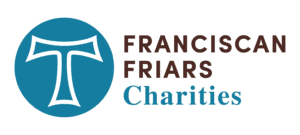
A normal part of life in Butler, New Jersey, (population 8,000) are when the bears come down from the nearby hills, foraging for food.
Only an hour’s drive from Manhattan, the northwest New Jersey borough, tucked away in Morris County near the New York border, also deals with other pressing issues. Its population is aging, its rubber manufacturing base is long gone, and new immigrants, many willing and able to work in low-wage jobs, struggle to get by.
Fr. Matthew Pravetz, OFM, pastor of St. Anthony of Padua Church in Butler, leads a parish which responds in a way that lives up to its Franciscan heritage in its concern for the poor.
The parish church is next door to a Franciscan home for 26 retired friars. The parish, a part of the Diocese of Paterson, has maintained a Franciscan connection since 1878. Serving the poor is central to its mission.
After the parochial school was closed because of a decline in the number of students, the parish found another kind of ministry for the building by converting the old school gymnasium into a community center. There a line forms every second Saturday of each month, largely comprised of senior retirees struggling on Social Security as well as immigrant working families seeking assistance to get them through hard times. The center also features a part-time health clinic staffed by volunteer nurses, where people can receive screenings and immunizations. It’s a service particularly valuable for immigrants unable to access basic medical care.
Interest in the center boomed during Covid and has not let up. It now serves some 130 households regularly.
Fr. Matthew came to St. Anthony of Padua as parochial vicar, before being named pastor, after 39 years of service in medical education. He was a professor and later academic dean at New York Medical College in Valhalla, then sponsored by the Archdiocese of New York. In that work, he was always conscious of his vocation as a Franciscan dedicated to the ideal of human dignity and lived in parishes, while he taught clinical and surgical anatomy as well as medical ethics.

One of his proudest achievements at the medical college wa instituting an event thanking the families who allowed their loved ones to be used as cadavers, advancing the cause of medical education, being of service even in death. He witnessed the marriages of dozens of students, who came to rely on him for spiritual support through their medical training.

As pastor at St. Anthony of Padua for the past year, he draws on his own experience in medical college education. He’s learned to navigate countless organizational meetings, in many ways similar to faculty conferences, organizing the work at hand. Fr. Matthew has focused on bringing more young families into church life, particularly through a revitalized religious education program which involves parents in the faith formation of their children.
His pastoral sense was honed though his years of service in medical education where his Franciscan vocation intersected with his scholarly duties.
“It has been helpful because as part of my training we were taught that you must, as Pope Francis says, smell like the flock. You can’t be above everybody else.”
As a rookie pastor, he’s found the reservoir of experience among the friars he lives with to be invaluable. Most had experience as pastors, and he draws upon their wisdom regularly. At St. Anthony of Padua, long known for the presence of friars, “there are a lot of people to fall back on,” he said.
So he has been able to merge his vocation as a Franciscan friar with the knowledge he developed through decades of medical education.

“We were trained never to feel superior to the students,” he said. “In my training we learned skills by practicing in the marketplace, so to speak, with people. We were taught to try to understand, and to get to know the people wherever they are. If anything else, it taught me to be humble.”
That understanding pastoral stance now extends to the poor of Butler who continue to offer the opportunity for St. Anthony of Padua Church to live up to its Franciscan ideal of service to the poor.

